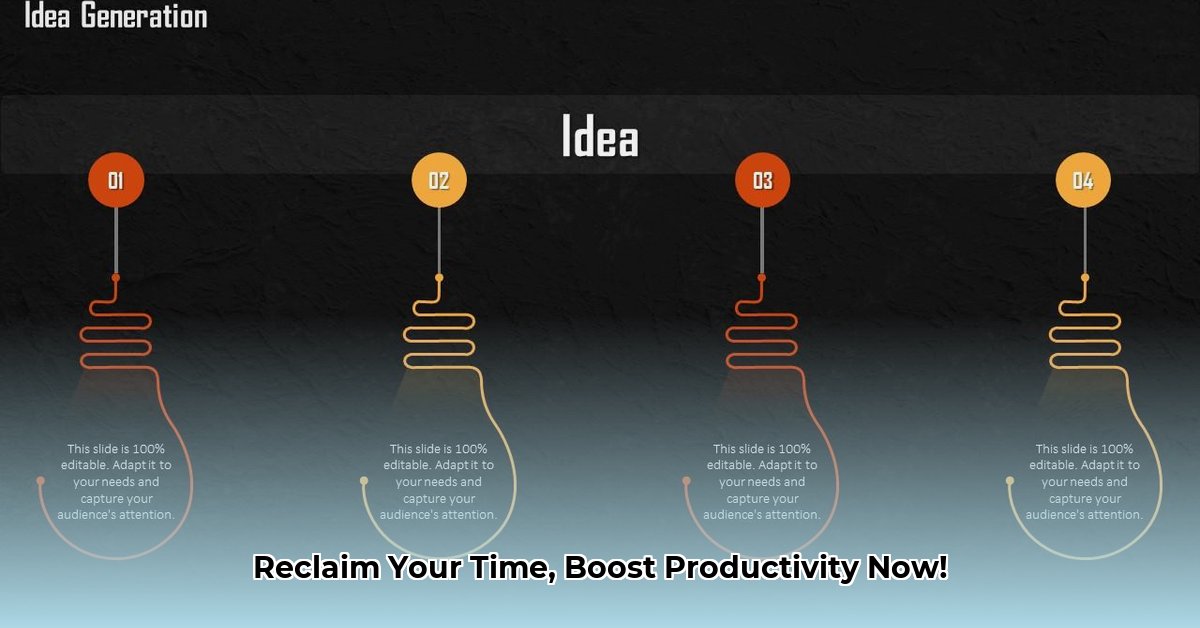Do you often feel overwhelmed by endless tasks and a never-ending to-do list? Are you constantly racing against the clock, struggling to meet deadlines? You’re not alone. The struggle with poor time management is a common one, leading to stress, decreased productivity, and a feeling of being constantly behind. However, it doesn’t have to be this way. This comprehensive guide will equip you with the knowledge and actionable strategies to take control of your time, boost your productivity, and achieve a more balanced and fulfilling life.
The Far-Reaching Consequences of Poor Time Management
Let’s face it: nobody enjoys the constant pressure of looming deadlines, the frustration of missed opportunities, or the gnawing feeling of being overwhelmed. These are all symptoms of poor time management, and their impact extends far beyond simply missing an appointment. Poor time management acts like a destructive force, negatively impacting your work, relationships, and overall well-being. Time is a non-renewable resource, and wasting it has significant consequences.
Consider this scenario: Mark, a talented software engineer, consistently underestimates the time required to complete his projects. He commits to unrealistic deadlines to impress his boss, only to find himself working late nights and weekends to catch up. As a result, his work quality suffers, he’s constantly stressed, and his relationships with his family deteriorate due to his lack of availability. Mark’s situation, though fictional, highlights the very real and far-reaching consequences of poor time management.
The Ripple Effect: How Poor Time Management Impacts Your Life
The detrimental effects of poor time management can be subtle and insidious, gradually eroding your well-being and hindering your progress. These effects manifest in various ways:
-
Decreased Productivity: Without a clear plan and effective strategies, tasks tend to pile up, leading to procrastination and a constant state of “catch-up.” You may be working long hours, but your output and efficiency suffer due to a lack of focus and organization.
-
Increased Stress and Anxiety: The pressure of unmet deadlines, unfinished projects, and a feeling of being constantly behind creates a breeding ground for stress and anxiety. This chronic stress can negatively impact your mental and physical health, leading to burnout and decreased overall well-being.
-
Damaged Relationships: Consistently missing appointments, canceling plans, and being unavailable due to poor planning can strain your relationships with family, friends, and colleagues. The lack of quality time spent with loved ones can create distance and resentment, ultimately damaging your social connections.
-
Missed Opportunities: Opportunities for career advancement, personal growth, and enriching experiences often present themselves unexpectedly. Poor time management can leave you feeling unprepared and unavailable to seize these opportunities, leading to regret and a sense of missed potential.
-
Financial Strain: Inefficient work practices, missed deadlines, and poor project management can lead to financial losses for both individuals and organizations. Rework, errors, penalties, and lost business opportunities can all contribute to financial strain.
Reclaiming Your Time: Actionable Strategies for Effective Time Management
The good news is that you can take control of your time and turn the tide. It’s not about becoming a productivity guru or adhering to rigid schedules; it’s about making conscious choices to prioritize what matters most and implementing strategies that work for you. By consistently applying the following techniques, you can experience a significant transformation in your productivity, well-being, and overall life satisfaction:
-
Prioritize with Purpose Using the Eisenhower Matrix: Instead of simply creating a to-do list, use the Eisenhower Matrix (also known as the Urgent-Important Matrix) to categorize tasks based on their urgency and importance. This powerful tool helps you focus your energy on high-priority activities while minimizing distractions from less critical ones.
- Urgent and Important: These are tasks that require immediate attention and should be done right away.
- Important but Not Urgent: These tasks are crucial for long-term success and should be scheduled for later.
- Urgent but Not Important: These tasks often involve interruptions and distractions and should be delegated if possible.
- Neither Urgent nor Important: These tasks are time-wasters and should be eliminated or minimized.
-
Plan Your Day in Advance (Even Briefly): Investing just 10-15 minutes each morning to plan your day can significantly improve your efficiency and focus. Review your to-do list, prioritize tasks using the Eisenhower Matrix, and schedule specific time slots for each activity. Think of this daily planning session as creating a roadmap for your day, providing direction and minimizing distractions.
-
Break Down Large Tasks into Smaller, More Manageable Steps: Overwhelming projects can often lead to procrastination and a feeling of being stuck. To overcome this, break down large tasks into smaller, more manageable steps. This makes the overall project seem less daunting and allows you to celebrate small wins along the way, maintaining motivation and momentum.
-
Eliminate Distractions and Minimize Interruptions: In today’s world, distractions are everywhere. Social media, email notifications, instant messaging, and talkative colleagues can all derail your focus and steal valuable time. Minimize these disruptions by turning off notifications, setting boundaries with colleagues, and creating a dedicated workspace free from distractions.
-
Time Blocking: A Powerful Tool for Focused Work: Time blocking involves allocating specific blocks of time for particular tasks or activities. This focused approach minimizes task-switching, maximizes concentration, and prevents distractions from creeping into your workflow. Treat these time blocks as appointments with yourself, and protect them fiercely.
-
Leverage Technology Wisely to Enhance Productivity: Numerous productivity apps, calendar tools, and to-do list managers can help you streamline your workflow and manage your time more effectively. However, it’s important to choose tools that simplify, not complicate, your life. Select a few tools that align with your needs and master their features to maximize their benefits.
-
Regularly Review and Refine Your Time Management System: Your time management system is not a static entity; it’s a dynamic process that requires regular review and refinement. Evaluate the effectiveness of your strategies, identify areas for improvement, and make adjustments as needed. This iterative process ensures that your system remains aligned with your goals and evolving needs.
The Long-Term Benefits: Reap the Rewards of Effective Time Management
The benefits of improving your time management skills extend far beyond immediate productivity gains. It’s an investment in your overall well-being, leading to reduced stress, a better work-life balance, improved relationships, and a greater sense of accomplishment and fulfillment. By taking control of your time, you gain a sense of control over your life, empowering you to pursue your goals and live a more balanced and meaningful existence.
Common Pitfalls to Avoid on Your Time Management Journey
Even with the best strategies, certain pitfalls can derail your efforts. Be aware of these common obstacles and take proactive steps to avoid them:
| Pitfall | Description | Mitigation |
|---|---|---|
| Perfectionism | The pursuit of unattainable perfection can lead to procrastination and wasted time. | Embrace “good enough”; focus on progress, not flawlessness. |
| Overcommitment | Taking on more than you can handle leads to burnout and substandard work. | Learn to say no; prioritize your tasks and commitments. |
| Lack of Self-Compassion | Being overly critical of yourself blocks progress and hinders learning. | Practice self-forgiveness; learn from mistakes and celebrate small wins. |
| Neglecting Breaks | Continuous work without rest diminishes focus, productivity, and overall well-being. | Schedule regular breaks; incorporate mindfulness techniques and relaxation exercises. |
| Failing to Delegate | Trying to do everything yourself leads to overwhelm and prevents others from growing. | Identify tasks that can be delegated and empower others to take ownership. |
Remember, mastering time management is a journey, not a destination. Start with small, achievable changes, celebrate your successes along the way, and consistently refine your approach. The rewards – reduced stress, improved relationships, increased productivity, and a more fulfilling life – are well worth the effort. You deserve to live a life free from the constant pressure and overwhelm of poor time management.
Calculating the Financial Impact of Poor Time Management Across Sectors
Key Takeaways:
- Poor time management directly translates into lost revenue, decreased profitability, and increased operational costs.
- The financial impact of inefficiency varies significantly across different sectors.
- Quantifying the financial impact requires analyzing lost productivity, missed opportunities, increased costs, and delayed projects.
- Implementing effective time management strategies leads to improved financial performance and enhanced employee well-being.
- Investing in time management training, tools, and resources offers a significant return on investment (ROI).
Unveiling the Hidden Costs of Inefficiency
Do you often find yourself reacting to crises instead of proactively planning and executing? That feeling of constantly putting out fires is more than just stress; it’s costing you money. Poor time management isn’t simply about missed deadlines or forgotten appointments; it’s about wasted resources, lost opportunities, and, ultimately, a significant hit to your bottom line. Understanding how to calculate the financial impact of poor time management in different sectors is a critical necessity for businesses and individuals alike.
Let’s explore how poor time management manifests and impacts various sectors:
-
Healthcare: Inefficient scheduling in hospitals can lead to longer patient wait times, reduced patient throughput, increased operational costs, and decreased patient satisfaction. A surgeon who mismanages their schedule might perform fewer surgeries per day, directly impacting revenue generation.
-
Manufacturing: Production delays caused by poor planning, inefficient processes, and lack of coordination can result in lost sales, increased inventory costs, and damaged customer relationships. Even small inefficiencies can significantly impact overall output in highly automated manufacturing environments.
-
Technology: In software development, missed deadlines, scope creep, and poor communication can lead to project cost overruns, dissatisfied clients, and delayed product launches. A sales team that is unable to effectively manage their time and prioritize leads can miss crucial sales targets and lose potential revenue.
-
Education: A teacher struggling with time management may have less time for individualized student attention, leading to decreased learning outcomes and requiring more remedial interventions. Inefficient administrative processes can also impact the overall effectiveness of educational institutions.
-
Construction: Delays in construction projects due to poor planning, resource mismanagement, and communication breakdowns can result in significant financial losses, including penalties, increased labor costs, and material waste.
A Practical Approach to Quantifying the Losses
Calculating the financial impact of poor time management may seem daunting, but it can be achieved with a systematic and data-driven approach. Here’s a step-by-step guide to help you quantify the losses:
-
Identify and Document Inefficiencies: Begin by meticulously identifying and documenting specific areas where time is wasted. This can be achieved through time tracking, process analysis, employee surveys, and performance reviews. Pinpoint the activities, tasks, or processes that consume excessive time without generating commensurate value.
-
Assign Monetary Values to Time and Resources: Estimate the hourly cost of labor (including wages, benefits, and overhead) for the relevant personnel involved in the identified inefficiencies. Quantify the cost of resources (materials, equipment, software) that are consumed or wasted due to inefficient time management practices.
-
Calculate Lost Productivity: Multiply the hourly cost of labor by the number of hours lost due to poor time management. This calculation provides a direct measure of the financial losses resulting from decreased productivity.
-
Account for Opportunity Costs: Consider the missed opportunities and potential revenue losses that occur as a result of delays, missed deadlines, or the inability to pursue strategic initiatives. Quantify the potential revenue that was lost due to inefficient time management practices.
-
Analyze Increased Operational Costs: Poor time management often leads to increased operational costs, such as overtime pay, expedited shipping fees, emergency repairs, and rework expenses. Identify and quantify these extra costs that are directly linked to time mismanagement.
-
Aggregate and Analyze the Data: Combine the calculations from steps 3-5 to gain a comprehensive view of the total financial impact of poor time management. Analyze the data to identify the areas with the greatest potential for improvement and prioritize your time management initiatives accordingly.
Transforming Time Management: A Path to Financial Prosperity
Effective time management is not just about saving time; it’s about maximizing resources, increasing productivity, and driving financial success. Prioritize tasks, delegate responsibilities when appropriate, utilize productivity tools and technologies, automate repetitive processes, and learn to say “no” to non-essential commitments. These proactive steps will not only save you money but also reduce stress, improve employee morale, and enhance overall organizational performance. Investing in time management training, resources, and tools is an investment that yields significant financial returns.
Future-Proofing Your Time Management: Essential Strategies for Sustained Success
Have you ever felt like you’re constantly playing catch-up, struggling to keep pace with the ever-increasing demands of your life and work? Do deadlines loom like dark clouds, casting a shadow over your productivity and well-being? Poor time management isn’t just an inconvenience; it’s a drain on your energy, a barrier to your goals, and a source of constant stress. But what if you could master time management not as a rigid set of rules, but as a flexible, adaptable system that empowers you to thrive in any situation? Let’s explore how to future-proof your time management approach for long-term success and lasting fulfillment.
Recognizing the Limitations of Traditional Methods
Many time management techniques – such as the Pomodoro Technique, the Eisenhower Matrix, or rigid daily schedules – can provide short-term productivity gains. However, these methods often fall short when faced with the unpredictable nature of life and work. A rigid system can easily crumble under the weight of unexpected projects, shifting priorities, personal emergencies, or unforeseen challenges. Future-proofing your time management involves building a resilient system that adapts to change, allowing you to navigate chaos with grace and achieve your goals with confidence.
A Step-by-Step Guide to Building a Future-Proof System
-
Assess Your Current Situation with Honesty: Before embarking on any new endeavor, take a realistic assessment of your current time management habits. What tools do you currently use? What are your biggest time-wasters? What are your strengths and weaknesses when it comes to managing your time? Honest self-reflection is essential for building a personalized system that truly works for you.
-
Prioritize Ruthlessly and Focus on High-Impact Activities: Not all tasks are created equal. Some activities generate significant results, while others yield minimal returns. Focus your energy on the high-impact activities that align with your long-term goals. Learn to delegate or eliminate less important duties that drain your time and energy without contributing significantly to your success.
-
Embrace Technology Wisely and Strategically: Explore the vast array of apps and tools designed for task management, calendar scheduling, time tracking, and automation. The right tools can significantly streamline your workflow, enhance your productivity, and free up valuable time for more strategic activities. However, avoid getting overwhelmed by too many options. Choose a few tools that align with your needs and workflow, and master their features to maximize their benefits.
-
Build Flexibility and Adaptability into Your System: Life is inherently unpredictable. Your time management system should be flexible enough to accommodate unexpected events, shifting priorities, and unforeseen challenges. Build buffer time into your schedule to allow for adjustments and course corrections. Don’t be afraid to reschedule tasks as needed to accommodate urgent matters. Rigid adherence to a plan often leads to frustration and burnout.
-
Regularly Review and Refine Your Approach: Time management is not a one-time fix; it’s an ongoing process of continuous improvement. Regularly review the effectiveness of your system and identify areas for refinement. Are you consistently meeting your goals? Are there any bottlenecks or inefficiencies that need to be addressed? Continuous adjustments are key to future-proofing your time management approach and ensuring its long-term effectiveness.
-
Integrate Self-Care and Prioritize Your Well-being: Burnout is a major threat to long-term success. Schedule time for rest, relaxation, and activities you enjoy. Prioritize your physical and mental well-being by engaging in regular exercise, healthy eating, and mindfulness practices. A well-rested and rejuvenated mind is a significantly more productive mind.
Adapting to Change: The Cornerstone of Long-Term Success
Think of your time management system as a garden. You need to plant the right seeds (goals and tasks), nurture them with consistent effort, and adapt to changing weather conditions (life’s curveballs). Future-proofing isn’t just about planning; it’s about cultivating a mindset of adaptability, flexibility, and resilience. This means being prepared to shift your strategies, adjust your priorities, and embrace unexpected opportunities as your life unfolds.
The Power of Proactive Planning and Strategic Thinking
Take the time to proactively plan your long-term goals and strategically allocate your time to ensure you’re consistently moving in the right direction. Break down large projects into smaller, more manageable steps to prevent overwhelm and maintain momentum. Visualize your desired outcomes and create a clear roadmap to guide your actions.
Key Takeaways for Future-Proofing Your Time Management
- Effective time management is an ongoing process of continuous improvement, not a one-time fix.
- Prioritization is paramount; focus on the activities that yield the highest returns and align with your long-term goals.
- Adaptability is essential; your system should be able to withstand life’s inevitable disruptions and unexpected challenges.
- Technology can be a powerful ally, but choose tools that align with your needs and streamline your workflow.
- Self-care is not a luxury, but a necessity for maintaining long-term productivity, well-being, and fulfillment.
- Regularly review and refine your strategies to ensure optimal performance and sustained success.
Community-Verified Time Management Tactics for Amplified Productivity
Key Takeaways:
- Poor time management negatively impacts productivity, well-being, and career advancement.
- Effective time management enhances focus, reduces stress, and leads to improved outcomes.
- Numerous proven techniques exist; experimenting to find what works best for you is essential.
- Consistency, adaptation, and self-awareness are crucial for sustained success.
Do you often feel like you’re drowning in a sea of tasks, constantly chasing deadlines, and perpetually teetering on the edge of overwhelm? That’s the high cost of letting time slip through your fingers, and it’s a common struggle shared by many. But don’t despair; effective time management is a skill that can be cultivated and refined. Let’s explore some community-verified time management tactics to boost productivity and help you reclaim control of your time.
Identifying and Understanding the Time Thieves
Before we delve into the solutions, let’s identify the culprits that are stealing your precious time. Are you constantly distracted by social media notifications? Do you struggle to prioritize tasks effectively, leading to wasted effort on low-value activities? Do endless interruptions throughout the day derail your focus and disrupt your workflow? These are common time thieves, and recognizing them is the first step towards reclaiming your schedule.
Mastering Proven Time Management Techniques
Numerous proven time management methods can transform your relationship with time, helping you achieve greater productivity, reduce stress, and enhance your overall well-being. Here are a few community-verified time management tactics to boost productivity:
-
The Pomodoro Technique: Work in focused bursts of 25 minutes, followed by short, 5-minute breaks. After every four “pomodoros,” take a longer break of 20-30 minutes. This structured approach improves concentration, prevents burnout, and promotes a sense of accomplishment.
-
The Eisenhower Matrix (Urgent/Important): Categorize your tasks based on their urgency and importance using the Eisenhower Matrix. This helps you prioritize what truly matters, delegate less important activities, and eliminate time-wasting tasks altogether.
-
Time Blocking: Schedule specific blocks of time for particular tasks or activities. Treat these appointments with yourself as seriously as you would any other meeting. This focused approach minimizes distractions, maximizes concentration, and ensures that you dedicate adequate time to your most important priorities.
-
The Two-Minute Rule: If a task takes less than two minutes to complete, do it immediately rather than postponing it. This simple rule helps you avoid procrastination and clear away small tasks that can clutter your mind and your schedule.
A Practical, Step-by-Step Guide to Implementation
Follow these steps to effectively integrate these techniques into your daily routine:
- Step 1: Conduct a Self-Assessment: Honestly evaluate your current time management habits, identifying your strengths, weaknesses, and the areas where you struggle the most.
- Step 2: Choose Your Preferred Method(s): Select one or two techniques that resonate with you and align with your personality, work style, and goals. Start small and don’t try to overhaul your entire system at once.
- Step 3: Implement the Chosen Technique(s) Consistently: Begin using the selected technique(s) consistently in your daily routine. Track your progress, monitor your results, and make adjustments as needed to optimize its effectiveness.
- Step 4: Review, Refine, and Adapt Your Approach: Regularly assess your time management approach, identifying what’s working effectively and what needs tweaking. Be flexible, adaptable, and willing to experiment to find the strategies that best suit your evolving needs.
Overcoming Procrastination: Tackling the Mental Game
Procrastination is a major time thief that can sabotage even the most well-intentioned time management efforts. It’s often rooted in fear of failure, perfectionism, or a feeling of being overwhelmed. Combat procrastination by breaking down large tasks into smaller, more manageable steps. Celebrate small victories to build momentum and maintain motivation. Remind yourself of your goals and the positive consequences of completing tasks on time.
The Long-Term Vision: Sustaining Productivity and Well-Being
Effective time management isn’t a sprint; it’s a marathon. Consistent application, self-awareness, and a commitment to continuous improvement are vital for long-term success. It’s about creating a sustainable system that supports your well-being, helps you achieve your goals, and allows you to live a more balanced and fulfilling life. This means incorporating self-care practices, setting realistic expectations, and learning to say “no” to commitments that don’t align with your priorities.
Remember, reclaiming your time isn’t just about boosting productivity; it’s about investing in yourself, prioritizing your well-being, and living a more intentional and fulfilling life. By mastering these community-verified time management tactics to boost productivity, you can transform your relationship with time and unlock your full potential.
- Mindfulness Exercises For Anxiety PDF To Reduce Stress - February 26, 2026
- Mindfulness Activities for Adults PDF for Stress Relief - February 25, 2026
- Mindfulness Techniques PDF Offers Free Exercises for Calm and Focus - February 24, 2026














